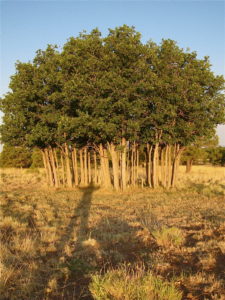 Small notes of music floated from a fountain of oak grove that had sprouted far enough off the dirt road to catch my eye but not draw my footsteps. The reedy small note of a harmonica sawed through an unfamiliar tune. From where I leaned against the hood of my truck, I couldn’t see the human source of the sounds. I looked for movement like I might look for a bird as a source of twittering. Of course I peered into trees first. And yes, below an arc of oak branches I saw a lump of human.
Small notes of music floated from a fountain of oak grove that had sprouted far enough off the dirt road to catch my eye but not draw my footsteps. The reedy small note of a harmonica sawed through an unfamiliar tune. From where I leaned against the hood of my truck, I couldn’t see the human source of the sounds. I looked for movement like I might look for a bird as a source of twittering. Of course I peered into trees first. And yes, below an arc of oak branches I saw a lump of human.
You know dirt roads around Flagstaff, how they invite, tease and become setting for dog walking or moon-rise rituals–or beer drinking and bonfire for some, mud-spraying joy for others. Out there are oak groves. There are many of them in all stages of maturity especially west and south of town. Most curves of hillside host a collection of oak saplings, trees you can’t quite put two hands around. Summer shade to critters. Eye catching green or yellow. And one day after a walk off A-1 Mountain Road, the oaks hosted harmonica notes, small sounds rising in sync with the planet breathing.
My day pack sprawls across the hood of my truck, everything barfed up. I go through it after hiking to make sure the water bottles haven’t leaked onto my journal and the binoculars are returned to the glove box and the egg shells and orange peels go into a garbage bag. I don’t want to grab that pack next week or next year and find anything molding. With my housekeeping, I hear a note of harmonica like a dog toy being squeezed by exuberant jaws. Whole notes and half notes lift and rise and blow away, music riding air currents like a cat tail shredded, bits of fluff floating. I decide it is a woman’s breath inhaling and exhaling across tiny reeds. I’d seen a lone woman in a red flannel shirt more than once out that dirt road, one of those wanderers like you might find with a tattered sleeping bag in the woods up at the end of Birch Street below Lowell Observatory, someone who sleeps within walking distance of the library bathroom, the train station or the shifting reality of a parking lot where one can get away with begging. In that oak grove, I saw a small shape of red and music and thought, good for you to get so far away from downtown.
I’ve heard women play harmonicas before. Once in the eight-bunk dorm of a youth hostel in Washington, D.C., I felt lucky to score a bed without a reservation. In those pre-online days you took your chances. I was always prepared to sleep in my car on a street, but how cozy to find a shared shower, a group kitchen and things marked FREE in a big refrigerator, a half loaf of bread left behind by a traveler or a perfect tin of tea from someone else who didn’t like Lipton. That day my brain had been mesmerized by the Smithsonian, and my heart was cracked open by Maya Lin’s Vietnam Veterans War memorial. Then more gifts unfolded when I found interesting storytellers at the hostel dinner table: a psychologist just back from a seven-week stay with Mother Teresa in Calcutta and a woman from China who had the most amazing smile and a wizened little hobo who described how she’s wandered for decades. She said she met her husband on opposite sides of train tracks. A freight passed and they were still smiling at each other, so they hobo-ed together for decades until he died, and still she wanders.
“Unable to make roots,” the psychologist sniffed when the hobo went into the kitchen to do dishes. “Attachment issues.”
Able to write and draw, I marveled. Mrs. Hobo made folded pamphlet “books” of her drawings and poems.
“Sometimes I stay with people who help me copy them,” she explained. She sold them for whatever money she could find along the way. Didn’t sell them, actually. She just made sure to put one in your hand, watch you smile at her pages and then step back to see if it would occur to you to give her dollars. I gave her a two-dollar bill I’d come across.
Later I didn’t know for sure. Lying in a top bunk with history and memorials and stories of the road crowding my tired young self, I heard a very quiet harmonica in the corner of the room playing taps. I don’t think it was the psychologist who seemed too full of categories for human experience to give in to becoming a tender renderer of music performance. Was it the Chinese woman without English? Or one of the other shapes of human who always arrives into a hostel bunkroom after hours, quiet or not, grateful or not, but there, alive with the rest of us. I wanted to think it was Mrs. Hobo, of course, shaping those long breaths before sleep into one more variety of soul sharing.
When my pack is restored to behind my truck seat, I wait to drive away, window down, still hearing a harmonica across the dirt road and at the same time another harmonica whispers.
When I lived in Patagonia, Arizona, a small town barely 20 miles north of Nogales, there was a wrinkled gal in a cowboy hat who pressed one pedal slowly and then the other pedal slowly to locomote to the post office on her three-wheel bicycle with a sign on the back: CANDY’S HARLEY. The sight of Candy moving past the hotel porch and park gazebo was one of the many emblems of sweetness in a town rich in Norman Rockwell moments. And if you attended a potluck or fair, patriotic celebration or fundraising fire department picnic, you might watch Candy stand up to the mic in front of other old timers to make familiar country music. Her cowboy hat would dip over her hands on the harmonica held to her mouth, and a chorus of song would rise out of a combo of guitar and keyboard and bass, a tune that looked chewed on while people nodded along until… Candy would lose her breath. And then instead of embarrassed fidgeting or performance shut down, the band would just pause. Candy would inhale with pinched concentration as if air could be found by just willing it so. Her face would screw up until finally oxygen obeyed and returned to her lungs and her shoulders would settle and notes would begin arriving again one by one until the band joined in and the song rode Candy’s inhalations to the finish line and hearty applause.
The next time I drove out A-1 Mountain Road I pulled over to walk to the oak grove where I’d heard a harmonica one day. I found the tatters of a green plaid sleeping bag and three empty cans of Beanie Weenies. I was relieved not to find a harmonica. I like to think it is still out there somewhere, inhale and exhale singing stories large and small.
Arizona-born Jean Rukkila is a retired fire lookout who writes from coffee houses, camp sites and libraries. See more of her writing at www.flagstaffletterfromhome.com.

